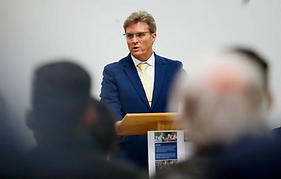Singh’s Meltdown, Bloc’s Power Play & Carney’s Trump Distraction
This week’s episode of Inside Politics with Kevin Klein tackled the fallout from the English-language federal leaders’ debate, aired just before the Easter weekend. Klein, a former politician and Minister of Environment in Manitoba, was joined by Winnipeg Sun contributors Jeff Currier and Royce Koop, a political science professor at the University of Manitoba, for a wide-ranging and at times blunt discussion about the state of the campaign, the debate format, and what Canadians can expect as the election draws near.
The three wasted little time digging into their main concern—the structure of the debate itself. Currier was critical of the current model, calling it “more showbiz than substance” and arguing for a return to direct, journalist-led interviews with leaders. “We’d learn a lot more from tough questions over an hour than these set-piece stage performances,” he said.
Koop was slightly more forgiving of the format, noting that this debate was better than some previous ones. “When candidates were allowed to actually debate each other, you saw who they really were,” he said. But Koop also flagged the persistent interruptions—especially from NDP leader Jagmeet Singh—as a problem that hurt the debate’s clarity and public value. He suggested Canada follow the U.S. example and consider muting microphones when candidates aren’t speaking.
Klein, meanwhile, focused his concern on the participation of Bloc Québécois leader Yves-François Blanchet, calling it undemocratic. He noted the Green Party was excluded from the French debate for not fielding candidates in every riding—yet the Bloc, which runs in only one province, was given a national platform. “That wasn’t a fair debate,” Klein said. “It felt like we were watching someone negotiating power, not discussing Canada’s future.”
Currier acknowledged the tension. “It’s awkward. You have a separatist party participating in shaping national conversation,” he said. But he added it’s politically difficult to exclude the Bloc in Quebec-specific events. Koop pushed back on that logic, suggesting debate criteria should change: “A party should have to run candidates in more than one province to participate. This is supposed to be a national debate.”
Discussion then turned to the broader tone and content of the debate itself. Currier dismissed the entire event as “devoid of big moments” and full of “falsehoods from all sides,” citing misleading claims from Carney, Polievre, and Singh alike. “I wasn’t impressed by any of them,” he said. Koop took a different view, saying Conservative leader Pierre Poilievre emerged as the clear winner, pointing to his measured tone and emotional close. “Polievre connected his policies to real struggles Canadians are facing. It was effective,” Koop said, referencing polling data that showed Poilievre scored best among viewers who watched the full debate.
The episode also touched on the rising concern over media framing and access. The panel criticized the Debate Commission’s decision to cancel post-debate media scrums, which Klein said undermined transparency. The exclusion of certain outlets sparked questions about fairness and freedom of the press. “The Debate Commission has not performed well this election,” Koop said. Currier added that media coverage overall has been “superficial,” lacking deep analysis on economic policy. “We’re talking more about Trump than GDP, and Canada’s dead last in G7 growth,” he said.
Klein closed the segment warning of a potential post-election Liberal-Bloc coalition. “If the Bloc props up a Liberal government, what does that mean for Western Canada? What incentive is there for Alberta or Saskatchewan to stay in confederation?” he asked. Koop and Currier noted that while the Bloc may hold influence, current polling trends suggest a possible Liberal majority, fueled in part by the NDP’s collapse.
But they agreed: polling isn’t always reliable. “The shy Tory effect is real,” Koop noted. “We may see things tighten in the final days.” Klein concluded by encouraging viewers to keep watching and stay engaged as the race unfolds.
New episodes of Inside Politics with Kevin Klein air weekly. Readers can find commentary from Klein, Currier, and Koop in the Winnipeg Sun and online at winnipegsun.com.


































